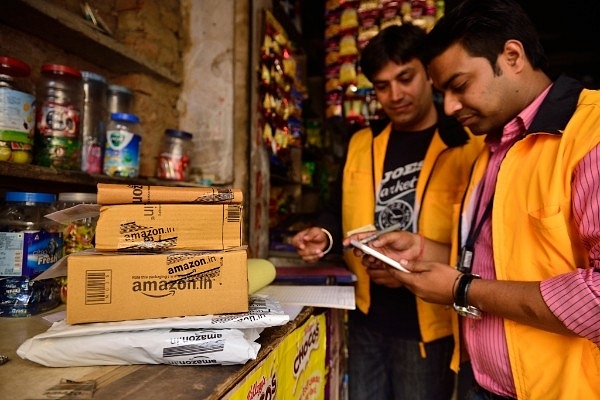Business
Amazon And Flipkart To Face Stricter E-Commerce Rules In India If Department Of Consumer Affairs Has Its Way
- According to reports, the Ministry of Electronics and Information Technology, as well as the Ministry of Commerce, are anticipated to meet with the Department of Consumer Affairs to further discuss the issue.

An Amazon pickup point in India. Representative image (Pradeep Gaur/Mint via Getty Images)
E-commerce companies such Flipkart and Amazon India would face a challenging situation if the consumer affairs department's proposed measures, which include a ban on flash sales and restrictions on scaling up private labels, are approved.
The Ministry of Consumer Affairs, Food and Public Distribution in India has announced major changes to the Consumer Protection (E-Commerce) Rules, 2020, including new registration requirements for online retailers and a ban on specific flash sales on any goods or services, as well as mandatory data sharing with government agencies. According to The Economic Times, the e-tailers will also struggle to scale up private brands, particularly ones that are synonymous with the firm's identity.
The government earlier had enacted regulations to prevent e-commerce companies from offering huge discounts, but this is the first time it has advocated a ban on flash sales.
Such sales are usually scheduled in advance of the release of new smartphones or other electronics. During these events, only a restricted amount of goods is released. Because of the discounts that come with new product introductions, flash sales create a buzz among consumers. These are significant events because they drive sales in a critical area for e-tailers—the smartphone is their largest revenue sector.
The report stated that according to the changes in the rules, flash sales are activities with the “intent to draw a large number of consumers” at significantly discounted pricing. Some industry insiders said that the planned modifications benefit offline retailers because they still have the freedom to stage any flash sale-like event.
Consumer Affairs Ministry said: “Conventional e-commerce flash sales are not banned. Only specific flash sales or back-to-back sales which limit customer choice, increase prices and prevents a level playing field are not allowed.”
As per the report, the Ministry of Electronics and Information Technology, as well as the Ministry of Commerce, are anticipated to meet with the Department of Consumer Affairs to further discuss the issue.
According to new regulations, e-commerce companies will be required to register with the Department of Promotion for Industry and Internal Trade (DPIIT). As per The Indian Express, these firms would also have to share data with “Government agency, which is lawfully authorised for investigative or protective or cybersecurity activities, for verification of identity, or for the prevention, detection, investigation, or prosecution, of offences under any law for the time being in force, or for cybersecurity incidents”.
The latest modification in the rules also proposes that the e-commerce companies must provide the information requested by the government agency within 72 hours of receipt of an order from the relevant authority. Reports said that the Consumer Affairs Ministry has recommended such firms to hire a grievance officer, a chief compliance officer and a nodal contact person to coordinate with law enforcement agencies 24 hours a day, seven days a week.
Additionally, the proposed guidelines appear to support the Centre's push for domestic goods. They recommend that e-commerce firms disclose the name and contact information of any importer from whom they have purchased products or services. Customers would also be given other options before purchasing to provide equitable opportunity for domestic goods.
The authorities have however requested feedback from stakeholders on the proposed revisions by 6 July.
The Confederation of All India Traders, a body representing local traders and sellers, who have been opposing practises by e-commerce giants such as Amazon and Flipkart, said: “The new draft is a guiding stone to purify the e-commerce landscape of the country, which has been greatly vitiated by various e-commerce global companies…”.
Archana Tewary, partner at J Sagar Associates told The Economic Times: “At first glance, it will be interesting to see how practically these changes will be implemented. These changes are wide-ranging and will have significant implications.”
This news comes just a few days after reports revealed that Flipkart has filed a legal challenge to an Indian court's decision to reopen an antitrust probe into its business operations. The e-commerce behemoth Amazon has joined the Walmart-owned indigenous company in challenging the court injunction.
Support Swarajya's 50 Ground Reports Project & Sponsor A Story
Every general election Swarajya does a 50 ground reports project.
Aimed only at serious readers and those who appreciate the nuances of political undercurrents, the project provides a sense of India's electoral landscape. As you know, these reports are produced after considerable investment of travel, time and effort on the ground.
This time too we've kicked off the project in style and have covered over 30 constituencies already. If you're someone who appreciates such work and have enjoyed our coverage please consider sponsoring a ground report for just Rs 2999 to Rs 19,999 - it goes a long way in helping us produce more quality reportage.
You can also back this project by becoming a subscriber for as little as Rs 999 - so do click on this links and choose a plan that suits you and back us.
Click below to contribute.
Latest